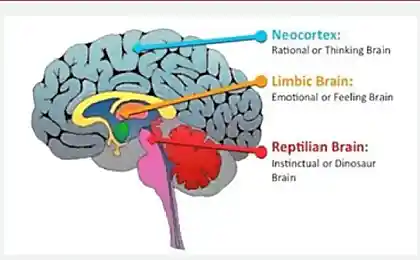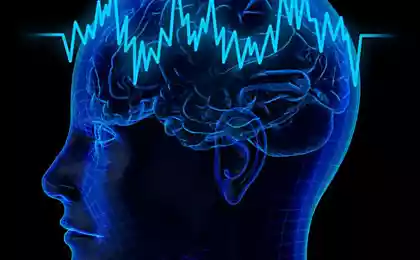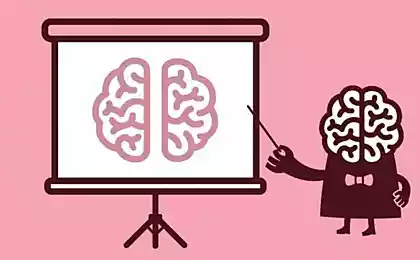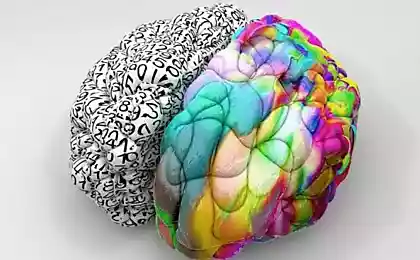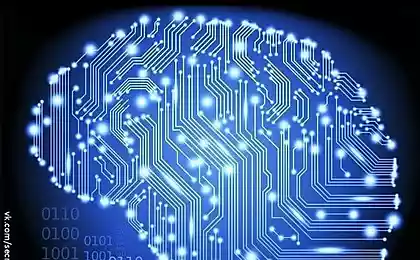476
Interesting facts about our brain
Fifty one million four hundred eighty nine thousand two hundred six
1. Physical activity stimulates the brain
To improve your mental abilities — move more. Physical activity ensures the supply of the blood brain, bringing glucose for energy and oxygen for purification of toxic particles. It also stimulates the production of protein, which promotes the creation of neural connections. Full physical activity two times per week reduce the risk of mental disorders by half and reduce the risk of developing Alzheimer's by 60 percent.
2. There are three different brain
It is believed that in our head signed not one, but three different brains. The first primitive brain, is responsible for the natural functioning of the biological organism; the second controls the emotions; and the third, located on top of the first two like a thin layer of jelly, and makes us highly evolved, intellectual beings.
3. We can focus only on one object at the same time
The attention centers in the brain can focus only on one object at a time. For the brain, there is no multi-tasking.
We are easier to perceive logical relationships and abstract concepts than memorize details.
Emotional arousal helps the brain learn.
Listeners can start to get bored after ten minutes of monotonous lectures or presentations, they can return with leads, causing violent emotions.
4. Short-term memory: repeat to remember
The memory has four stages: storage (or encoding), storage, reproduction and forgetting.
Entering the brain instantly split into fragments and transmitted for storage in different areas of the cerebral cortex. Most of the events in the process of learning, also remembered in the first few seconds of learning. The more carefully we encode the information in the beginning, the better it is remembered.
To increase the chances of remembering it is possible if to reproduce the conditions under which the information is first received in the brain.
5. Improving the reliability of long-term memory
Most of the information fades from memory within minutes after the perception, but one that will survive this period, will eventually become fixed.
The brain gives us only an approximate picture of reality, as it blends new knowledge with memories from the past and stores them as a single unit.
Long-term memory can be more reliable if you enter new information gradually and repeat after certain intervals.
6. Good sleep — good thinking
The brain is constantly in a state of confrontation between cells and chemicals that seek to send you to sleep and cells and chemicals to keep you awake.
The activity of neurons in the brain during sleep, rhythmic and extremely high — perhaps because the play received during the day.
The need for sleep and rest people are different, but the need for midday sleep is common to all.
Lack of sleep affects attention, ability to purposeful activity, working memory, mood, logical reasoning and even motor skills.
7. Stress affects the brain's ability to learn
The protective system of the body — the adrenaline and cortisone — is designed to enable instant reaction to a serious, but short-lived threat to life. Chronic stress, such as unfavorable home atmosphere, having a devastating impact on the system, intended for short-term reactions.
Chronic stress adrenaline leads to the formation of scars in the blood vessels, which can lead to heart attack or stroke, but cortisone destroys the cells of the hippocampus, crippling the ability to learn and remember.
The most severe stress causes a feeling of lack of control over the situation, that is, the feeling of helplessness.
Nervous stress impairs children's ability to learn and reduces the productivity of employees.
8. Sensory integration: engage more of the senses
We perceive information about the event using the senses, translate it into electrical signals that are sent to certain parts of the brain, so it was reconstructed by fragments of the overall picture.
Deciding how to combine the signals that the brain partially relies on previous experiences, so two people have different perceptions of the same event.
Our senses work together — vision affects hearing, for example, and so therefore, we learn better when stimulated by multiple senses at the same time.
Smell has the ability to resurrect memories. Perhaps this is because olfactory signals (nerve impulses) are analyzed in the area of the brain, which is involved in the formation of emotions and motivation. But emotions, as is well known, closely connected with memory.
9. Vision is more important than the other sensory organs
Vision is more important than the other senses, it consumes half the resources of the brain.
What we see is that commands us to see the brain, and the accuracy of the reproduced picture is far from 100 percent.
Analysis and processing of visual information occur in stages. The retina of the eye accumulates the light energy in short, like the movies of the information track. The visual cortex of the brain processes the received signals (some region recorded movement of other color, etc.) and combines them into a holistic view.
Visual information is better remembered and reproduced than the printed text or oral speech.
10. The brains of men and women are different
Males have one x chromosome and women have two, despite the fact that one of them is redundant.
Genetically women are more complicated because the active x chromosomes of the cells are a set of maternal and paternal cells. Men get x-chromosome from mother and y-chromosome contains less than 100 genes, while the x chromosome carries about 1500 genes.
The structure and biochemical composition of the brain of men and women are different — for example, men have a bigger amygdala and produce serotonin faster.
Men and women react differently to acute stress: women involve the amygdala of the left hemisphere, and remember the details of the emotions. Men use the amygdala of the right hemisphere and perceive the essence of the problem.
from the book by John Medina "brain Rules"
Source: newgoal.ru/
1. Physical activity stimulates the brain
To improve your mental abilities — move more. Physical activity ensures the supply of the blood brain, bringing glucose for energy and oxygen for purification of toxic particles. It also stimulates the production of protein, which promotes the creation of neural connections. Full physical activity two times per week reduce the risk of mental disorders by half and reduce the risk of developing Alzheimer's by 60 percent.
2. There are three different brain
It is believed that in our head signed not one, but three different brains. The first primitive brain, is responsible for the natural functioning of the biological organism; the second controls the emotions; and the third, located on top of the first two like a thin layer of jelly, and makes us highly evolved, intellectual beings.
3. We can focus only on one object at the same time
The attention centers in the brain can focus only on one object at a time. For the brain, there is no multi-tasking.
We are easier to perceive logical relationships and abstract concepts than memorize details.
Emotional arousal helps the brain learn.
Listeners can start to get bored after ten minutes of monotonous lectures or presentations, they can return with leads, causing violent emotions.
4. Short-term memory: repeat to remember
The memory has four stages: storage (or encoding), storage, reproduction and forgetting.
Entering the brain instantly split into fragments and transmitted for storage in different areas of the cerebral cortex. Most of the events in the process of learning, also remembered in the first few seconds of learning. The more carefully we encode the information in the beginning, the better it is remembered.
To increase the chances of remembering it is possible if to reproduce the conditions under which the information is first received in the brain.
5. Improving the reliability of long-term memory
Most of the information fades from memory within minutes after the perception, but one that will survive this period, will eventually become fixed.
The brain gives us only an approximate picture of reality, as it blends new knowledge with memories from the past and stores them as a single unit.
Long-term memory can be more reliable if you enter new information gradually and repeat after certain intervals.
6. Good sleep — good thinking
The brain is constantly in a state of confrontation between cells and chemicals that seek to send you to sleep and cells and chemicals to keep you awake.
The activity of neurons in the brain during sleep, rhythmic and extremely high — perhaps because the play received during the day.
The need for sleep and rest people are different, but the need for midday sleep is common to all.
Lack of sleep affects attention, ability to purposeful activity, working memory, mood, logical reasoning and even motor skills.
7. Stress affects the brain's ability to learn
The protective system of the body — the adrenaline and cortisone — is designed to enable instant reaction to a serious, but short-lived threat to life. Chronic stress, such as unfavorable home atmosphere, having a devastating impact on the system, intended for short-term reactions.
Chronic stress adrenaline leads to the formation of scars in the blood vessels, which can lead to heart attack or stroke, but cortisone destroys the cells of the hippocampus, crippling the ability to learn and remember.
The most severe stress causes a feeling of lack of control over the situation, that is, the feeling of helplessness.
Nervous stress impairs children's ability to learn and reduces the productivity of employees.
8. Sensory integration: engage more of the senses
We perceive information about the event using the senses, translate it into electrical signals that are sent to certain parts of the brain, so it was reconstructed by fragments of the overall picture.
Deciding how to combine the signals that the brain partially relies on previous experiences, so two people have different perceptions of the same event.
Our senses work together — vision affects hearing, for example, and so therefore, we learn better when stimulated by multiple senses at the same time.
Smell has the ability to resurrect memories. Perhaps this is because olfactory signals (nerve impulses) are analyzed in the area of the brain, which is involved in the formation of emotions and motivation. But emotions, as is well known, closely connected with memory.
9. Vision is more important than the other sensory organs
Vision is more important than the other senses, it consumes half the resources of the brain.
What we see is that commands us to see the brain, and the accuracy of the reproduced picture is far from 100 percent.
Analysis and processing of visual information occur in stages. The retina of the eye accumulates the light energy in short, like the movies of the information track. The visual cortex of the brain processes the received signals (some region recorded movement of other color, etc.) and combines them into a holistic view.
Visual information is better remembered and reproduced than the printed text or oral speech.
10. The brains of men and women are different
Males have one x chromosome and women have two, despite the fact that one of them is redundant.
Genetically women are more complicated because the active x chromosomes of the cells are a set of maternal and paternal cells. Men get x-chromosome from mother and y-chromosome contains less than 100 genes, while the x chromosome carries about 1500 genes.
The structure and biochemical composition of the brain of men and women are different — for example, men have a bigger amygdala and produce serotonin faster.
Men and women react differently to acute stress: women involve the amygdala of the left hemisphere, and remember the details of the emotions. Men use the amygdala of the right hemisphere and perceive the essence of the problem.
from the book by John Medina "brain Rules"
Source: newgoal.ru/
How to avoid poisoning poisonous mushrooms
Serious in the Funny, Criticism in the Social Caricature of Pavel Kuchinsky



